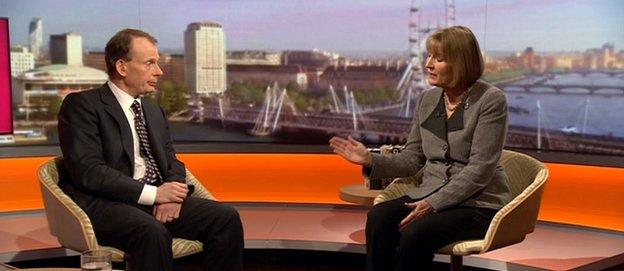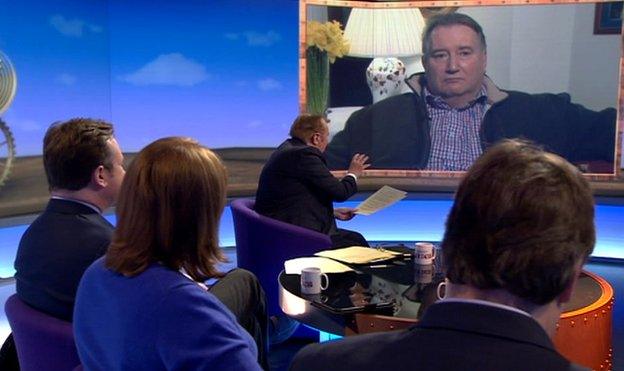Harriet Harman dismisses fears of union 'domination'
- Published
Harriet Harman, deputy Labour leader, has denied there would be a 'rubber stamping' of proposals to alter how the party selects its leadership.
Deputy Labour leader Harriet Harman has defended plans to change the rules on how the party's leader is elected, rejecting fears of union domination.
She said allowing union members to pay £3 to affiliate to Labour and then vote in the leadership elections would "breathe fresh light" into the party.
Ms Harman told the BBC it was "phobic" about trade unions not to let their members, "working people", have a say.
The Tories say the changes will make it easier for unions to pick leaders.
The change is one part of Labour leader Ed Miliband's proposed shake-up of the party's historic relationship with the trade unions.
Mr Miliband said future leadership contests would be decided by a one member, one vote election which would mean union members could pay £3 to affiliate to Labour and then get a leadership vote which would be equal to that of full members of the party.
Ed Miliband: "Giving ordinary people a say in our party"
There are about 200,000 Labour Party members and 2.7m trade unionists and it was put to Ms Harman on the Andrew Marr Show that the change would mean - even if only one in 10 took up the £3 option - union members having a greater say on choice of leader than full members.
She said: "It's not about the numbers, it's about opening up the Labour Party to people at workplaces up and down the country, broadening the base of the Labour Party but doing it in a legitimate way and a realistic way.
"They will be ordinary people at work and this will reinvigorate the party at local level. It will breathe fresh light into the Labour Party.
"A lot of people feel that politics is out of touch and people in parties don't understand their lives. To have a strong local connection between people who are living and working locally... is what politics and our democracy needs in this country."
March conference
Asked about the prospects of union members dominating local Labour parties, she said: "I think it is being slightly phobic about trade unions - why shouldn't a care worker or somebody who works in a warehouse have a say about the leader of the party they support and the party they are paying towards."

Harriet Harman said students and members of the armed forces also had cut price membership options
Asked if the changes would "tilt" the Labour Party generally in a union direction, Ms Harman said: "If you mean people who care about more people being able to get jobs, being able to get the living wage, caring about decent terms and conditions, caring about equality and social justice well yes, that's a good thing, that's what the Labour Party believes in."
She said the changes would be discussed by Labour MPs this week, before going to the national executive ahead of a "Labour conference" in March to either approve or reject the plan.
Currently - under Labour's electoral college system - MPs and MEPs get a third of the votes to select a new leader, trade unions get a third and party members another third.
That system is to be abolished with every party member and those union members who donate to the party having an equal say.
Under Labour's plans, from the end of 2014 new members of unions affiliated to the party would have to opt in and pay a £3 fee to Labour and then get a leadership vote, despite not being a full member of the party.
This process would be phased in over five years for existing union members.
Registered supporters of the party, a fairly new category aimed at offering an alternative to joining the party, would also get a vote in leadership elections.
But MPs would retain the sole right to nominate leadership candidates. The threshold those candidates would need is also to be raised - possibly to 20% of Labour's MPs.
At present, trade union members pay a levy to the party - decided by the union - unless they opt out.
The BBC also understands that unions will retain 50% of the votes at the party's conference.
The leader of the GMB union, Paul Kenny, told the BBC's Sunday Politics that the changes were not yet a "done deal" and still had to be approved by Labour national executive.
He said that change to one member one vote was "a completely sensible idea".
"I know there are some people who are upset about it, mostly MPs who will lose their golden share but it really is a nonsense that one MP should have the same voting strength as 1,000 party members," he added.

Paul Kenny told Sunday Politics Labour donations would depend on what was in the party's manifesto
But Mr Kenny also warned that any attempt to break the unions' voting power at party conference or within the party's ruling NEC would break any deal.
Conservative party chairman Mr Shapps said: "Ed Miliband promised to loosen the trade union barons' grip on the Labour Party. But he has been too weak to deliver.
"Until now, the union barons could buy Labour's policies and pick Labour's leader. After these changes, it will be even easier for the union barons to buy Labour's policies and even easier to pick the leader."
He added: "Ed Miliband has shown he's too weak to stand up to the union barons who own him, too weak to stand up for hardworking people and too weak to offer a long-term economic plan to secure Britain's future."
Conservative Party Chairman Grant Shapps: "I do not think it is right to have trade union barons deciding policy"
The Labour leader embarked on reforming the union link after a selection row in Falkirk last year when allegations of vote-rigging surfaced involving the Unite union.
No wrongdoing has been found to have taken place.
- Published31 January 2014
- Published1 February 2014
- Published22 July 2013
- Published30 January 2014
- Published29 January 2014